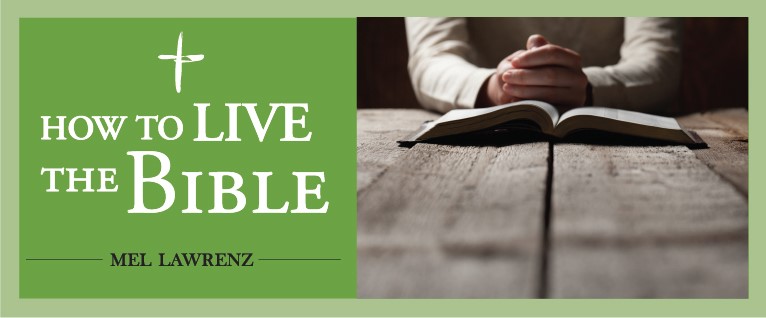
This is the seventy-third lesson in author and pastor Mel Lawrenz’ How to Live the Bible series. If you know someone or a group who would like to follow along on this journey through Scripture, they can get more info and sign up to receive these essays via email here.
See Mel Lawrenz’s book, How to Study the Bible: A Practical Guide.
I am glad when I have the opportunity to speak with people who are having doubts about their faith. Don’t get me wrong, I’m not glad about the pain that they experience in one of the most intimate issues of life. And that pain can be intense–like a husband or wife who is whispering hints about having cheated on their spouses. Or like the pain that follows the death of a loved one. Those conversations are often halting, quiet, scattered. I have never met someone of faith who wanted to have doubts about their faith, because it really isn’t about doubting faith–it’s about doubting God.

For many, doubt is like driving into a fog. You didn’t see it coming, but now you’re in it. You don’t know how to get out of it, you don’t know what way to turn, and you don’t even remember exactly where you were when you got into it. You’re not asking for the fog; it’s just how things are.
The reason I say I’m glad for those conversations is that it is better for someone experiencing doubt to talk to someone than to let doubt fester. Like grief, doubt itself does not injure; it is often the result of injury. Most important to know: our doubts do not injure God because nothing can injure God. It is possible to insult God because any of us are capable of disrespect, but apparently doubt in the form of sincere questioning is not an insult to God. The Bible never says that the moment we waver, God is ready to cut us off.
But ultimately the question we need to answer is: how are we going to deal with doubt? The answer is somewhat different if you think about the doubt of the utter skeptic or the passing doubt of the believer who has been tossed into uncertainty because of a life crisis. But in either case, the only effective response to doubt is to get ourselves rooted in real faith.
In Colossians the apostle Paul says:
“See to it that no one takes you captive through hollow and deceptive philosophy, which depends on human tradition and the basic principles of this world rather than on Christ. For in Christ all the fullness of the Deity lives in bodily form, and you have been given fullness in Christ, who is the head over every power and authority” (Colossians 2:8-10).
How do you deal with doubt? You tell yourself that you’re not inventing faith, you don’t have to have all of life’s questions answered today, you don’t need to figure out exactly where you will be five years from now. God knows. You just have to take the next step.
Now, to switch metaphors, there is tremendous assurance that if you are on the walk of faith with Christ as Lord, you’re doing the right thing because you have been “rooted,” and “built up,” and “strengthened” (Colossians 2:6-7). Every time we have the sense of being uprooted by some tornado that has come through our lives—a sudden and unexpected loss, a betrayal, a time of doubt—we can recall that we are not like a willow tree, with shallow roots, susceptible to every passing storm. We—by God’s work—are like an elm or oak with a massive root system that goes deep and holds fast. The healthy life of faith is both about the foliage and fruit at the top, and strength and health in the roots.
When something happens that tears us down, we have the assurance that we have been “built up” and “strengthened” in Christ. We didn’t build the superstructure of faith. It is God’s truth, and we live in the shelter of it.
All of this leads to “thanksgiving,” and that too keeps us walking in the right direction. When you have a strong sense of gratitude for what God has meant and what God has done in the tough times and in the easy times, the act of thanksgiving keeps us looking up. So many of the Psalms say: “lift up your eyes,” because that is when we can see God ahead of us. Nobody ever got closer to God or was strengthened by him who carries a chip on his or her shoulder that God has not done enough lately.
That brings us to a second point mentioned in this passage from Colossians: the challenge of “hollow philosophies” which can have a captivating allure, but are essentially deceptions. Dealing with doubt is sometimes a matter of dismay and discouragement because of life’s difficulties, but sometimes doubt is the wreckage resulting from deception.
___________
[If you believe this series will be helpful, this is the perfect time to forward this to a friend, a group, or a congregation, and tell them they too may sign up for the weekly emails here]
Mel Lawrenz (@MelLawrenz) trains an international network of Christian leaders, ministry pioneers, and thought-leaders. He served as senior pastor of Elmbrook Church in Brookfield, Wisconsin, for ten years and now serves as Elmbrook’s minister at large. He has a PhD in the history of Christian thought and is on the adjunct faculty of Trinity International University. Mel is the author of 18 books, including How to Understand the Bible—A Simple Guide and Spiritual Influence: the Hidden Power Behind Leadership (Zondervan, 2012). See more of Mel’s writing at WordWay.
The post How to Live the Bible — Doubt and Deception appeared first on Bible Gateway Blog.













